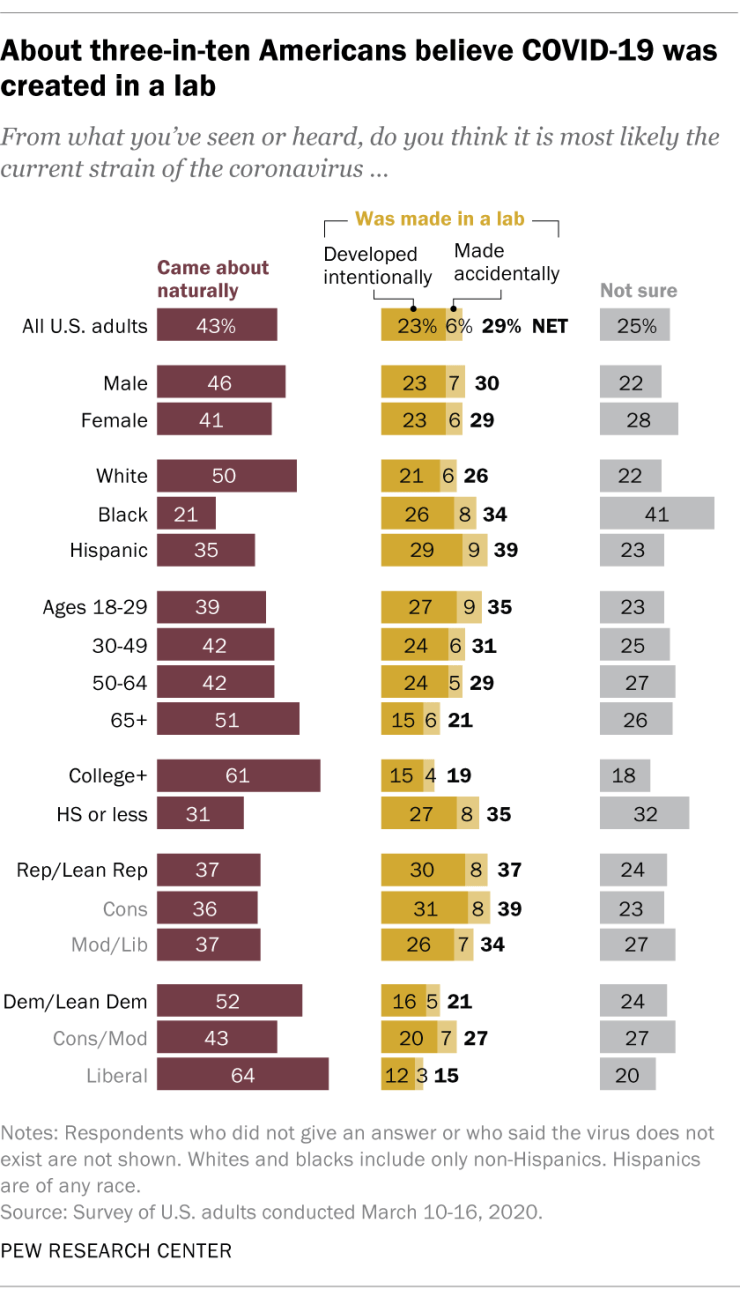The Friday Edition
Nearly three-in-ten Americans believe COVID-19 was made in a lab
Source: Pew Research Center
Published April 8, 2020
As news and misinformation about the COVID-19 pandemic has spread, many Americans have encountered conflicting narratives about how the new coronavirus originated. Scientists have determined the virus came about naturally, but there is some uncertainty about how it first infected people.

While a plurality of Americans (43%) say the new coronavirus most likely came about naturally, nearly three-in-ten (29%) say it most likely was created in a lab, according to a Pew Research Center survey conducted from March 10 to 16, 2020, as part of the Center’s nearly yearlong Election News Pathways project.
Around a quarter of adults (23%) say it is most likely that the current strain of coronavirus was developed intentionally in a lab; another 6% say it was most likely made accidentally in a lab. A quarter say they aren’t sure where the virus originated.
|
How we did this
All survey participants are members of the Center’s American Trends Panel, a nationally representative online survey panel. Panelists were recruited by telephone or mail so that nearly every U.S. adult has a known chance of being selected. The data is weighted to further ensure it reflects the U.S. adult population by gender, race, ethnicity, partisan affiliation, education and other categories.
Here are the questions asked for this report, along with responses, and its methodology. Visit our interactive data tool to access the data on the coronavirus pandemic and other issues related to news and the election. |
Americans differ by age, education level and race and ethnicity when it comes to who believes that the virus was created in a lab:
- Younger adults are more likely than older people to say the virus was developed in a lab. For example, about a third of adults ages 18 to 29 say the virus was developed in a lab (35%), compared with 21% of adults 65 and older. Nearly four-in-ten (39%) adults under 30 say it came about naturally, while 51% of those 65 and older say this.
- Educational attainment is also a factor. Those with a bachelor’s degree or more education are less likely than those with a high school diploma or less education to say the coronavirus was created in a lab (19% vs. 35%). A majority (61%) of those with at least a bachelor’s degree say the virus came about naturally, compared with 31% of those with a high school diploma or less.
- The belief that the coronavirus was created in a lab also is more prevalent among Hispanic and black Americans than among whites. About four-in-ten Hispanic adults (39%) say the virus was created in a lab. Among black adults, 34% say the same. Around a quarter of white adults (26%) say it was developed in a lab.
- When it comes to political affiliation and ideology, Republicans and Republican-leaning independents are more likely than Democrats and Democratic leaners to say the coronavirus was created in a lab (37% vs. 21%). About four-in-ten conservative Republicans say this (39%), the largest share of any ideological group.
Confusion surrounding these facts parallels Americans’ overall experience with misinformation during the outbreak. About half of U.S. adults (48%) report having come across at least some news and information about COVID-19 that seemed completely made up, with 12% saying they have seen a lot of it and 35% saying they have seen some.
Note: Here are the questions asked for this report, along with responses, and its methodology.
LATEST OPEN LETTERS
-
03-02TO WORLD LEADERS
-
06-01Standing in Solidarity with the People of Venezuela
-
21-07Freedom
-
20-03Stand up to Trump
-
18-02Average Americans Response
-
23-12Tens of thousands of dead children.......this must stop
-
05-06A Call to Action: Uniting for a Lasting Peace in the Holy Land
-
28-05Concerned world citizen
-
13-02World Peace
-
05-12My scream to the world
VIRTUAL POST OFFICE
PETITIONS
LINKS
DONATION
Latest Blog Articles
-
12-02Our Friday News Analysis | What the World Reads Now!
-
11-02Our Wednesday News Analysis | From the Age of Catastrophe to the Age of Hope: Why a Free Palestine Matters to the World
-
10-02From the Age of Catastrophe to the Age of Hope: Why a Free Palestine Matters to the World
-
10-02Like a Gambler Who Lost His Fortune, Israel Wants Another War
-
10-02The next stage of the Gaza genocide has begun
-
09-02The Evangelical Pope | God is Present Among You
-
05-02Our Friday News Analysis | What the World Reads Now!
-
04-02Our Wednesday News Analysis | Trump’s Board of Peace and the politics of control
-
03-02Trump’s Board of Peace and the politics of control
-
03-02Weaponizing America’s Economy in Service of Israel
-
03-02The Final Expulsion of Palestinians Is Underway – and Your Indifference Enables It
Latest Comments
 One of the most important and illuminating articles that I …
One of the most important and illuminating articles that I …
Comment by Benjamin Inbaraj And what's wrong here?
After all, there is the homeland …
And what's wrong here?
After all, there is the homeland …
Comment by Isac Boian Does this reinforce or deny my argument that Israel is …
Does this reinforce or deny my argument that Israel is …
Comment by Edward Campbell Many 'say' they support the Palestinian cause but do little …
Many 'say' they support the Palestinian cause but do little …
Comment by Philip McFedries The UN is strangled by the "war for profit" cabal …
The UN is strangled by the "war for profit" cabal …
Comment by Philip McFedries I can't read the printing on the map.
I can't read the printing on the map.
Comment by Philip McFedries Good news!
Good news!
Comment by Philip McFedries
COMMENTS
This article has 0 comments at this time. We invoke you to participate the discussion and leave your comment below. Share your opinion and let the world know.